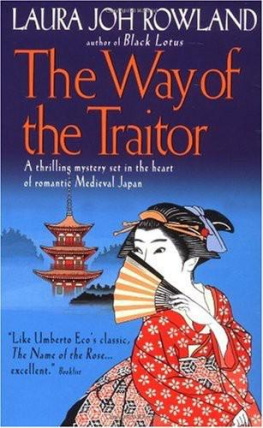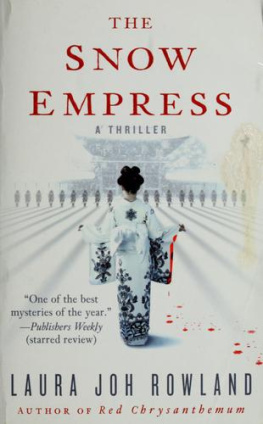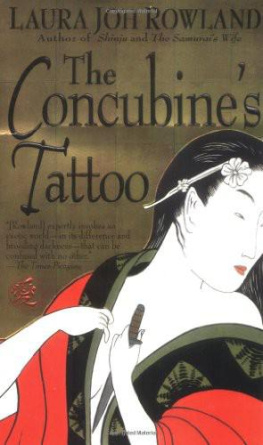Laura Joh Rowland - The Way of the Traitor
Here you can read online Laura Joh Rowland - The Way of the Traitor full text of the book (entire story) in english for free. Download pdf and epub, get meaning, cover and reviews about this ebook. year: 1998, publisher: HarperTorch, genre: Adventure. Description of the work, (preface) as well as reviews are available. Best literature library LitArk.com created for fans of good reading and offers a wide selection of genres:
Romance novel
Science fiction
Adventure
Detective
Science
History
Home and family
Prose
Art
Politics
Computer
Non-fiction
Religion
Business
Children
Humor
Choose a favorite category and find really read worthwhile books. Enjoy immersion in the world of imagination, feel the emotions of the characters or learn something new for yourself, make an fascinating discovery.
- Book:The Way of the Traitor
- Author:
- Publisher:HarperTorch
- Genre:
- Year:1998
- Rating:5 / 5
- Favourites:Add to favourites
- Your mark:
- 100
- 1
- 2
- 3
- 4
- 5
The Way of the Traitor: summary, description and annotation
We offer to read an annotation, description, summary or preface (depends on what the author of the book "The Way of the Traitor" wrote himself). If you haven't found the necessary information about the book — write in the comments, we will try to find it.
The Way of the Traitor — read online for free the complete book (whole text) full work
Below is the text of the book, divided by pages. System saving the place of the last page read, allows you to conveniently read the book "The Way of the Traitor" online for free, without having to search again every time where you left off. Put a bookmark, and you can go to the page where you finished reading at any time.
Font size:
Interval:
Bookmark:
Laura Joh Rowland - Sano Ichiro 03 - Way of the Traitor
JAPAN
GENROKU PERIOD, YEAR 2, MONTH 5
(June 1690)
Prologue
LIKE A PALE moon, the sun's white globe rose in a mesh of drifting clouds above the eastern hills beyond Nagasaki, the international port city on Kyushu, the westernmost of Japan's four major islands. Mist clung to the forested slopes and shrouded the city clustered around the. Bells echoed from hillside temples, over the governor's stately mansion, the townspeople's thatched houses, and the foreign settlements. In the harbor, a salt-laden summer breeze stirred the sails of Japanese fishing boats, Chinese junks, and myriad vessels from the exotic, faraway lands of Arabia, Korea, Tonkin. A patrol barge glided down the corridor formed by the harbor's high, wooded cliffs, past the watchtowers, toward a calm sea. On the western horizon, the silhouettes of distant ships appeared as dawn gradually pushed back night's curtain.
On a steep road leading away from town, a low, anguished moaning heralded a solemn procession. First came Nagasaki's highest officials "mounted samurai dressed in black ceremonial robes and caps "then four hundred lesser dignitaries, attendants, servants, and merchants, all on foot. Last marched a small army of soldiers armed with swords and spears, guarding the terrified prisoner in their midst.
oNo, whispered the samurai between his moans, which grew louder as the procession climbed higher into the hills. He had been stripped of his swords, and all clothing except a loincloth. He tried to break free, but heavy shackles hobbled his ankles; ropes bound his wrists behind his back. Spears prodded him up the path. oThis can't be happening!
Amid the lower ranks of officials, one witness fought back fear and nausea. He hated watching executions, but his attendance at this one was mandatory, along with that of everyone else who had dealings with Nagasaki's foreign community. The bakufu "the military dictatorship that ruled Japan "wanted to remind them all of what would happen to anyone who violated the nation's harsh antitreason laws, to warn them against any allegiance with the foreigners, no matter how innocent, or any act of disloyalty toward the government. Here, in the only place where foreigners were allowed in Japan, an ambitious man might gather powerful allies and launch a rebellion against the Tokugawa regime. To prevent this, the bakufu enforced the laws more rigorously than anywhere else in the country, devoting immense effort to identifying and punishing traitors. Even a minor infraction would inevitably lead to death.
oWhy are you doing this? the prisoner pleaded. oI beg you, have mercy!
No one answered. The march continued relentlessly, until at last the members of the procession gathered on a plateau overlooking the city and harbor. None spoke, but the witness sensed their emotions, hovering in the moist air like a malignant cloud: fear; excitement; disgust. He watched, terrified and appalled, as the army bore the captive into the center of the plateau.
There waited four grim, muscular men with cropped hair, wearing ragged kimonos. One, hammer in hand, stood beside a newly erected frame composed of two wooden pillars joined by a crossbeam. Two others seized the prisoner's arms and forced him to his knees beside the man holding a sword; the sharp blade gleamed in the dawn light. These were eta, outcasts who served as executioners, and they were ready to cut off the prisoner's head and mount it on the frame as a warning to would-be criminals.
oNo! the prisoner screamed. oPlease! Straining away from his captors, he entreated the audience. oI've committed no crimes. I haven't done anything to deserve this!
The witness longed to clap his hands over his ears and shut out the screams, to close his eyes against the sight of the panic-stricken samurai whose courage had fled before this ultimate disgrace, to deny his terrible sense of identification with the condemned prisoner.
Hoofbeats clattered as the governor of Nagasaki urged his horse forward. oThe prisoner, Yoshid Ganzaemon, is guilty of treason, he announced in grave, ceremonial tones.
oTreason? The samurai ceased struggling, his face blank with shock. oI'm not a traitor. I've served the shogun well all my life. His voice rose in disbelief. oI'm the hardest-working officer in the harbor patrol. I always volunteer for extra duty. I risk my life in rough weather. I practice the martial arts so that I can someday bring my lord glory on the battlefield. I've never acted against the shogun or his regime. Whoever says so is lying!
But the governor's voice drowned out his plea. oYoshid Ganzaemon has cravenly denounced the lord to whom he owes his ultimate duty and loyalty. He has called His Excellency the Shogun Tokugawa Tsunayoshi a weak, stupid fool.
The witness knew that Yoshid had insulted the shogun during a party in the pleasure quarter, where the courtesans flattered and the sake flowed freely, removing men's inhibitions and loosening their tongues. Nagasaki boasted more spies than anywhere else in Japan, all alert to the slightest transgressions. They'd overheard Yoshid's careless words and brought him to this sorry fate as they had many others.
oI didn't mean it, Yoshid protested. oI was drunk; I didn't know what I was saying. A thousand apologies! He tried to bow, but the two eta held him firmly. oPlease, you can't kill me for one little mistake!
No one spoke in his defense, not even the witness, who knew of the man's exemplary record and character. To take a traitor's side would mean sharing his guilt, and punishment.
oFor his dishonor, Yoshid Ganzaemon is hereby sentenced to death. The governor nodded to the executioners.
Now the prisoners fear turned to rage. oSo you condemn me as a traitor? he shouted at the silent, watchful assembly. oWhen there are much, much worse criminals in Nagasaki than I? Harsh, bitter laughter exploded from him. oJust take a look around Deshima, and you'll see!
The crowd stirred; murmurs swept the plateau like a troubled wind. The witness gasped at the accusation, for Yoshid spoke the truth. By unfortunate accident, the witness had discovered shocking activity on Deshima, the Dutch trade colony. He'd observed clandestine comings and goings, illegal transactions, forbidden collusion between foreigners and Japanese. Even worse, he believed he knew who bore the primary responsibility for the crimes. Now his bowels loosened; he swayed dizzily. If an underling like Yoshid knew about the crimes, then who else did, or would eventually find out?
The governor held up a hand, arresting all sound and motion. oProceed! he ordered.
The eta seized the looped knot of hair at Yoshid ~s nape and yanked, forcing his head high, holding it immobile. The witness's heart thudded; his limbs went numb and cold in horrible empathy. He saw himself in Yoshid's place, ready to die not in glorious battle, or honorably by his own hand in ritual suicide as befitting a samurai, but in disgrace, a convicted traitor.
Then he pictured the person he suspected of the Deshima crime, kneeling beside the executioner whose sword now rose in a high, deadly arc. A person to whose fate his own was inextricably bound. Would they die together like this, someday? The penalty for a crime of such magnitude was death not just for the criminal, but also for his whole family and all close associates. Please, the witness prayed in mute terror, let it not happen!
oOh, yes, there are bigger villains than I, who are probably committing their evil, treasonous deeds even now. Punish them instead!
Yoshid's hysterical voice echoed through the hills, in vain. Panic sharpened the witness's senses. He heard the crowd's simultaneous intake of breath, smelled anticipation mingling with the salty sea breeze. Under the sun's blind, merciless eye, and over the hammering of his own heart, he heard Yoshid scream: oNo, please, no no no NO!
Font size:
Interval:
Bookmark:
Similar books «The Way of the Traitor»
Look at similar books to The Way of the Traitor. We have selected literature similar in name and meaning in the hope of providing readers with more options to find new, interesting, not yet read works.
Discussion, reviews of the book The Way of the Traitor and just readers' own opinions. Leave your comments, write what you think about the work, its meaning or the main characters. Specify what exactly you liked and what you didn't like, and why you think so.















